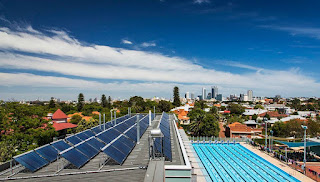Dive into Comfort: Maintaining Your Swimming Pool at a Consistent Temperature with a Heat Pump
Introduction:-
Nothing beats the sheer pleasure of plunging into a refreshing pool, especially on a scorching summer day. However, maintaining the perfect swimming pool temperature can be quite challenging. Fluctuating temperatures can turn your oasis into a chilly or uncomfortably warm experience. Fortunately, there is a solution that ensures year-round comfort: a heat pump. In this article, we will explore how a heat pump can maintain your swimming pool at a consistent temperature, providing you with an enjoyable and relaxing swimming experience no matter the season.
I. Understanding Heat Pumps:-
To comprehend the benefits of using a heat pump for your swimming pool, it's essential to understand how they work. A heat pump is a device that extracts heat from the air, water, or ground, and transfers it to another location at a higher temperature. It operates on the same principle as a refrigerator but in reverse.
A heat pump for a swimming pool typically consists of three main components: the evaporator, the compressor, and the condenser. The process begins with the evaporator coil, where a refrigerant absorbs heat from the air or water passing over it. The compressor then increases the temperature of the absorbed heat, and the condenser transfers the heat to the pool water, effectively raising its temperature.
One significant advantage of using a heat pump is its energy efficiency. Unlike traditional pool heaters that generate heat, a heat pump simply moves heat from one place to another, requiring significantly less energy input. This energy-saving aspect makes heat pumps a sustainable and cost-effective choice for maintaining your swimming pool temperature.
II. Benefits of Using a Heat Pump:-
A. Consistent Temperature Control: One of the primary advantages of a heat pump is its ability to maintain a consistent pool temperature regardless of external conditions. Whether you're battling a chilly autumn breeze or a scorching summer sun, a heat pump can adjust the water temperature to your desired level, ensuring a comfortable swimming experience throughout the year.
B. Energy Efficiency and Cost Savings: Heat pumps are known for their energy efficiency, making them an environmentally friendly choice. By utilizing the ambient air, water, or ground as a heat source, heat pumps consume significantly less energy compared to other heating systems. This efficiency translates into cost savings on your energy bills, allowing you to enjoy your pool without worrying about excessive expenses.
C. Extended Swimming Season: With a heat pump, you can extend your swimming season well beyond the summer months. Even during cooler seasons, a heat pump can keep your pool water at a desirable temperature, enabling you to enjoy a relaxing swim or host poolside gatherings all year round.
D. Environmentally Friendly Operation: As heat pumps rely on renewable energy sources, they produce lower greenhouse gas emissions compared to traditional pool heaters. By opting for a heat pump, you are making an eco-conscious choice that contributes to reducing your carbon footprint.
E. Low Maintenance Requirements: Heat pumps are designed to be low maintenance, requiring minimal attention to keep them operating efficiently. Regular cleaning and occasional servicing are usually sufficient to ensure optimal performance. It's essential to follow the manufacturer's recommendations and have your heat pump inspected by a professional technician periodically.
III. Tips for Optimal Heat Pump Performance:-
While heat pumps offer numerous advantages, following a few maintenance and operational tips will help you maximize their performance and longevity.
A. Regularly Clean the Air Filter: The air filter in your heat pump plays a crucial role in maintaining efficiency. Clean or replace the filter as recommended by the manufacturer to ensure proper airflow and prevent the accumulation of debris that can hinder performance.
B. Maintain Clear Airflow: Ensure that there is ample space around your heat pump for unrestricted airflow. Remove any obstructions, such as leaves, grass, or furniture, that could impede the unit's ventilation.
C. Monitor and Adjust Settings: Stay vigilant about monitoring the temperature settings on your heat pump. Lowering the temperature when the pool is not in use or during cooler seasons can help conserve energy without compromising comfort.
D. Consider a Pool Cover: Investing in a pool cover can provide additional insulation, helping to retain heat and reduce heat loss. A cover also helps keep debris out of the pool, reducing the strain on the heat pump's filtration system.
E. Schedule Professional Maintenance: While regular maintenance tasks can be performed by the pool owner, it is advisable to schedule professional maintenance annually. A trained technician can inspect and fine-tune your heat pump, ensuring optimal performance and identifying any potential issues before they become major problems.
Conclusion:-
By investing in a heat pump for your swimming pool, you can Maintaining Your Swimming Pool at a Consistent Temperature with a Heat Pump throughout the year, offering you and your loved ones a delightful and comfortable swimming experience. The energy efficiency, extended swimming season, cost savings, and environmental benefits of heat pumps make them an attractive option for pool owners. By following the maintenance tips outlined in this article, you can maximize the performance and longevity of your heat pump, ensuring it operates smoothly for years to come. So, take the plunge and enjoy the luxury of a consistently heated swimming pool, transforming your backyard into a personal oasis of relaxation, fun, and serenity.

Comments
Post a Comment